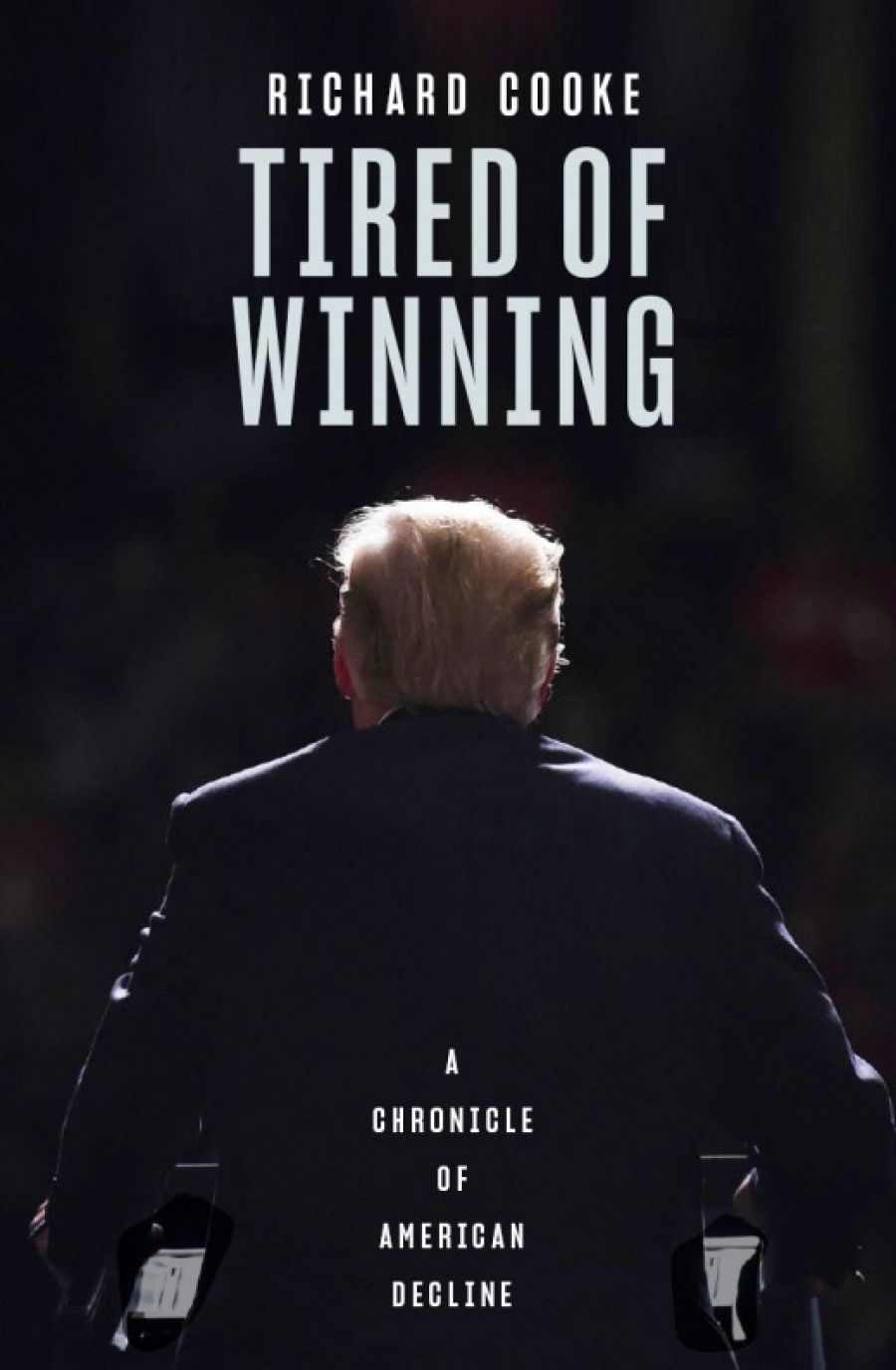
- Free Article: No
- Contents Category: Politics
- Custom Article Title: Varun Ghosh reviews <em>Tired of Winning: A chronicle of American decline</em> by Richard Cooke
- Review Article: Yes
- Online Only: No
- Custom Highlight Text:
Tired of Winning: A chronicle of American decline by journalist and essayist Richard Cooke begins with the shock of Donald Trump’s election on 8 November 2016. In New York’s Lincoln Square, thousands of Clinton supporters were ‘stunned into silence’ while ‘a posse of drunk frat boys in MAGA caps announced themselves ...
- Book 1 Title: Tired of Winning
- Book 1 Subtitle: A chronicle of American decline
- Book 1 Biblio: Black Inc., $27.99 pb, 240 pp, 9781760641146
Cooke catalogues other signs of rot, such as the poisoning of the water supply in Flint, Michigan, and the bane of mass shootings. These problems predate the forty-fifth president. They have their roots in geography and history; in ignorance and economic insecurity; in vested interest and political corruption. Implicit in the author’s focus on these matters, however, is that they somehow help to explain why the country voted for Trump.
Trumpism itself forms another thread of Cooke’s narrative. While the legislative achievements of the Trump administration are modest and the president has not yet made a catastrophic blunder of the magnitude of George W. Bush’s decision to invade Iraq, Trump has changed the country at a visceral level, weaponising bigotry and devaluing truth itself. In both of these endeavours, the internet and social media have proved valuable tools.
Trump’s impact on the Republican Party has been even more significant. Once the party of Dwight D. Eisenhower and Ronald Reagan, the GOP is now dominated by ‘the cult of Trump’, its voter base idolising a president who publicly equivocated when asked to condemn a neo-Nazi march in Virginia and, who has, in the words of late Republican Senator John McCain, ‘abased himself’ before Russian president Vladimir Putin.
 Donald Trump and Vladimir Putin at the APEC Summit in Da Nang, Vietnam, 10 November 2017 (photograph via Wikimedia Commons)
Donald Trump and Vladimir Putin at the APEC Summit in Da Nang, Vietnam, 10 November 2017 (photograph via Wikimedia Commons)
Yet, underestimating Donald Trump is a dangerous political course. While Tired of Winning is critical of Trump throughout, some of Cooke’s more insightful observations arise from his contemplation of the president’s appeal. Trump, more than any other candidate in 2016, understood the importance of American exceptionalism to the national psyche. He said in 2016: ‘We’re going to win so much. You’re going to get tired of winning, you’re going to say, “Please, Mr President, I have a headache. Please, don’t win so much. This is getting terrible.”’ The quote is seemingly inane, but the sentiment spoke to widely held insecurities about America’s future. As Cooke observes:
This is a country providential in its founding and prodigious in its conception. Until now, it has believed itself exceptional in theory and practice.
When Trump voters angrily repudiated free-trade deals and wars in the Middle-East they had voted for previously, at first it seemed like a paradox. After all, hadn’t they voted for these things in the first place? But it’s not really so inexplicable: they had entered these conflagrations expecting to win. We are now bearing witness to America’s enraged and sometimes dangerous reconciliation with these failures.
Cooke also writes of the appeal of Trump’s language and style as a politician: ‘When the knowledge economy and its adjuncts take the spoils and the dignity of labour disappears, it makes sense that a revolt against this state of affairs is an unlettered one, the linguistic equivalent of a dirty protest, crass and deliberately offensive, wilfully ignorant …’ Trump’s ability to invoke and amplify this sense of frustration and resentment is beyond doubt.
While Trump looms large in Tired of Winning, the book also traverses other ground. However, Cooke’s essays describing the experience of attending a college football game or shooting at a gun range feel time-worn, and his observations about gun violence bring little new to the subject. Further, as an aggregation of essays on disparate topics, the book is inevitably superficial and, at times, lacks coherence. Digressions into the work of Philip Roth and Patricia Lockwood seem distinctly out of place.
In spite of these limitations, Tired of Winning is worth reading. Cooke’s writing is fluent and engaging throughout – at turns humorous, poignant, and censorious. The book also contains thought-provoking social observations and political insights, though its place in the chronicles of the Trump administration is likely to be fleeting.


Comments powered by CComment